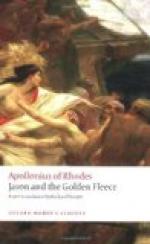“Bethink ye what they would have done in their cowardice if haply some god had brought Heracles hither. Assuredly, if he had been here, no trial would there have been of fists, I ween, but when the king drew near to proclaim his rules, the club would have made him forget his pride and the rules to boot. Yea, we left him uncared for on the strand and we sailed oversea; and full well each one of us shall know our baneful folly, now that he is far away.”
Thus he spake, but all these things had been wrought by the counsels of Zeus. Then they remained there through the night and tended the hurts of the wounded men, and offered sacrifice to the immortals, and made ready a mighty meal; and sleep fell upon no man beside the bowl and the blazing sacrifice. They wreathed their fair brows with the bay that grew by the shore, whereto their hawsers were bound, and chanted a song to the lyre of Orpheus in sweet harmony; and the windless shore was charmed by their song; and they celebrated the Therapnaean son of Zeus.[1]
[Footnote 1: i.e. Polydeuces.]
But when the sun rising from far lands lighted up the dewy hills and wakened the shepherds, then they loosed their hawsers from the stem of the bay-tree and put on board all the spoil they had need to take; and with a favouring wind they steered through the eddying Bosporus. Hereupon a wave like a steep mountain rose aloft in front as though rushing upon them, ever upheaved above the clouds; nor would you say that they could escape grim death, for in its fury it hangs over the middle of the ship, like a cloud, yet it sinks away into calm if it meets with a skilful helmsman. So they by the steering-craft of Tiphys escaped, unhurt but sore dismayed. And on the next day they fastened the hawsers to the coast opposite the Bithynian land.
There Phineus, son of Agenor, had his home by the sea, Phineus who above all men endured most bitter woes because of the gift of prophecy which Leto’s son had granted him aforetime. And he reverenced not a whit even Zeus himself, for he foretold unerringly to men his sacred will. Wherefore Zeus sent upon him a lingering old age, and took from his eyes the pleasant light, and suffered him not to have joy of the dainties untold that the dwellers around ever brought to his house, when they came to enquire the will of heaven. But on a sudden, swooping through the clouds, the Harpies with their crooked beaks incessantly snatched the food away from his mouth and hands. And at times not a morsel of food was left, at others but a little, in order that he might live and be tormented. And they poured forth over all a loathsome stench; and no one dared not merely to carry food to his mouth but even to stand at a distance; so foully reeked the remnants of the meal. But straightway when he heard the voice and the tramp of the band he knew that they were the men passing by, at whose coming Zeus’ oracle had declared to him that he should




